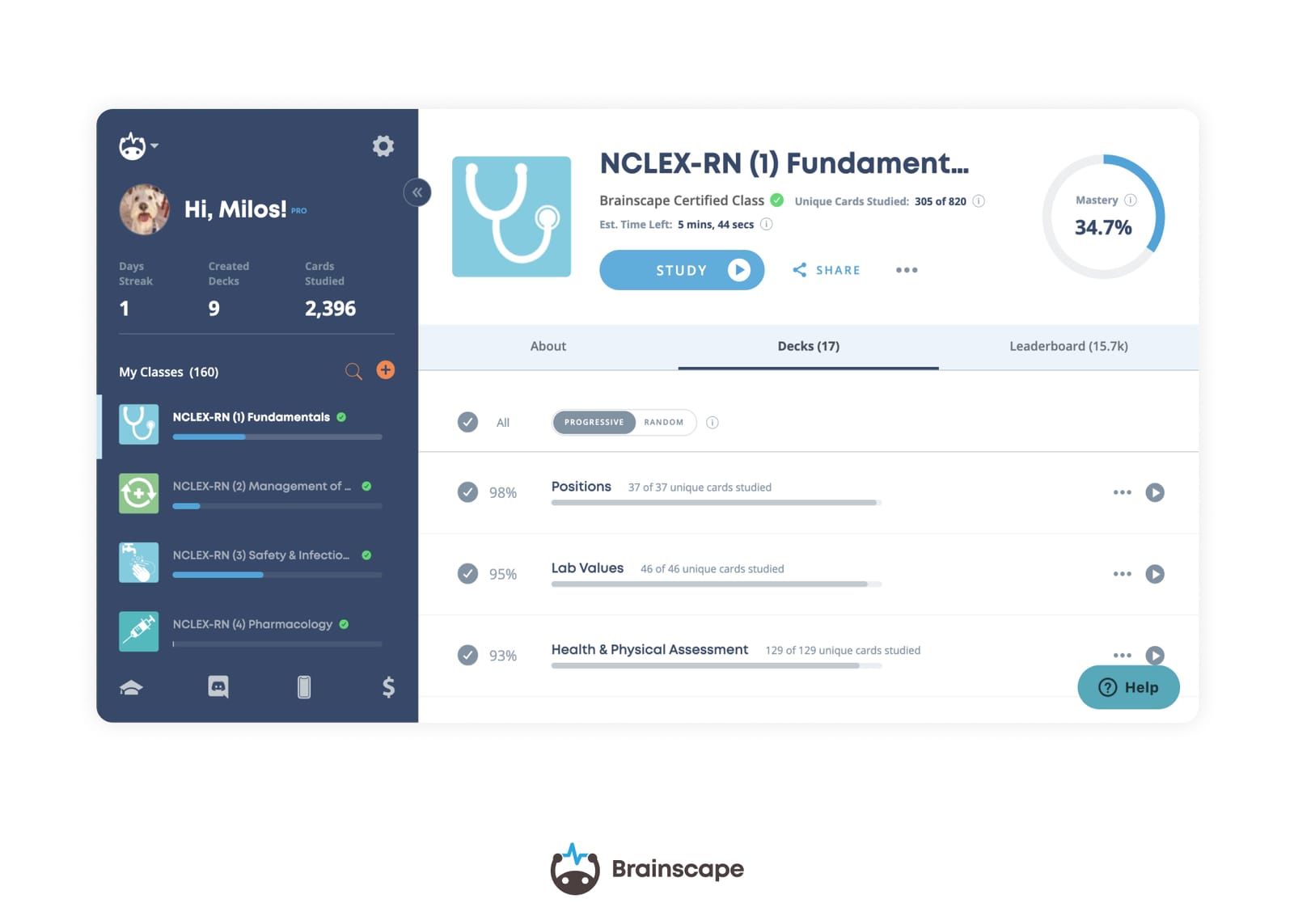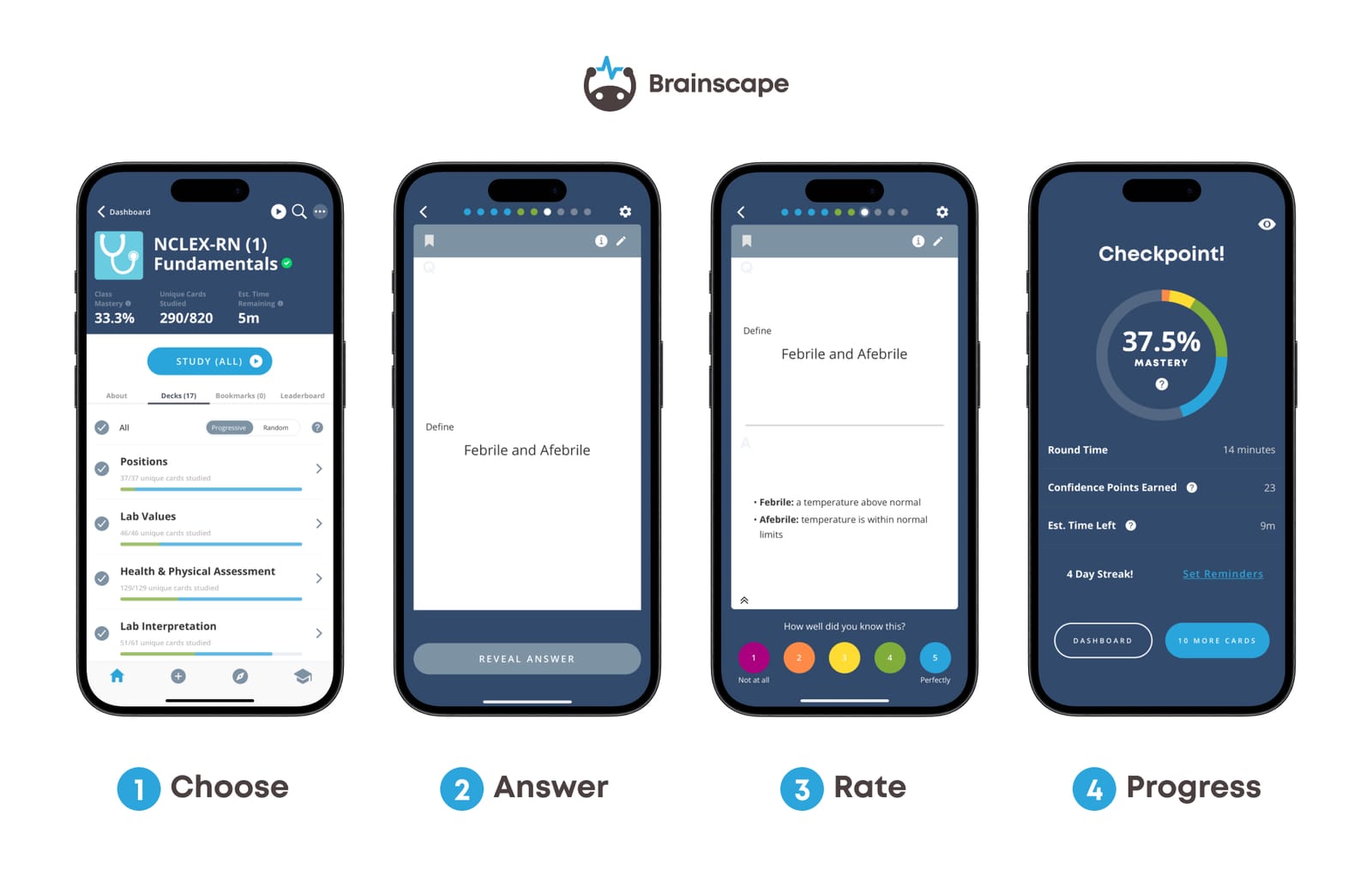The National Council of State Boards of Nursing (NCSBN) shook things up in 2023 by revamping the questions in the NCLEX. They’re calling it Next Generation NCLEX (NGN). But how does this differ from the old NCLEX?
As you likely know, the National Council Licensure Examination (NCLEX) is the standardized test that nursing students must pass in order to become licensed as a registered nurse (RN) or a licensed practical nurse (LPN). The test is designed to assess the knowledge, skills, and abilities that are essential for entry-level nurses to provide safe and effective care to patients.
With the introduction of Next Generation NCLEX questions in 2023, both nurse students and educators were forced to rethink their studying / instructional strategies because these questions differed from the traditional, multiple-choice format in several ways…
How Do Next Generation NCLEX Questions Differ?
Next Gen NCLEX was heralded as the “new and improved” version of this milestone examination, which countless students and educators have invested a ton of time into trying to understand, either so that they can pass it themselves or help other students do so.
And considering that the NCLEX is the gateway through which every nursing student must travel in order to establish a career in healthcare, it’s little wonder that the changes made people a little nervous at the time.
So, how do Next Generation NCLEX questions differ from their predecessors?
Next Gen NCLEX Questions Focus On Case Studies Or Real Scenarios
There is a shift towards examining real healthcare scenarios and case studies, which compel test-takers to analyze the information and make a clinical judgment (as you would if you were a practicing nurse). This means that students need to really understand the underlying principles and concepts behind the question, rather than simply memorizing facts.
The exam now presents three unfolding case studies with six questions each, all focusing on the same patient, for a total of 18 healthcare scenarios. Other questions are included, too, including up to 10 questions that are a bit more complex than your traditional Select All That Apply (SATA).
Next Gen NCLEX Questions Are More Complex
Because of the aforementioned simulation of case studies, NGN questions tend to be more complex, requiring a higher level of critical thinking.
The reason this doesn’t suck, contrary to how you may be feeling after reading this, is because it’s FAR better to make your mistakes outside the clinical healthcare environment—on an exam, say—than when someone’s life could be at stake! The NCLEX is simply trying to make sure you are prepared to provide quality healthcare.
Next Gen NCLEX Features New Types Of Questions
The NGN has adjusted its questioning in FIVE ways:
- Extended multiple-response questions, which essentially expand on the number of possible answers for all the multiple-response questions.
- Extended drag-and-drop questions: Test-takers are required to drag the correct response(s) into one of the blank answer spaces provided, but now they’ll have to determine whether to use some or ALL of the options provided.
- “Cloze” type or Drop-Down questions: Test-takers are required to complete a statement by selecting the correct answers from a drop-down menu of answers, for example:
- Enhanced “Hot Spot” questions require you to HIGHLIGHT or select relevant words or phrases from a sample medical record that corresponds to the question itself.
- Matrix / Grid questions: features rows and columns with options that you must select, for example:
Next Gen NCLEX Questions Cross-Pollinate Subject Areas
Secondly, Next Generation NCLEX questions are designed to assess the test-taker's ability to integrate and apply knowledge across different areas of nursing. For example, a question might require you to consider how a patient's medications, laboratory values, and physical examination findings are related.
In other words, you shouldn’t learn each topic in isolation. Instead, you should be able to quickly switch between different concepts, understand how they relate to each other, and be comfortable assessing real clinical scenarios that involve multiple interleaving factors.
So, to start studying a random, yet optimized mix of nursing content across multiple classes, click on the configure icon to the left of the ‘Smart Study’ button in mobile and adjust your settings accordingly.
Next Gen NCLEX Questions Align More Closely With Actual Nursing Practice
Next Generation NCLEX questions are more closely aligned with the nursing practice and the outcomes that are important for patient safety and quality of care. The NCSBN developed Next Gen NCLEX questions using an evidence-based approach, which means that the questions are based on the most current and relevant research and practice standards.
How Did Next Gen NCLEX Changes Make Your Life Easier?
At this point, you might be asking yourself why the heck the NCSBN would do this to you and every other student out there, who is just trying to pass this exam so they can join the workforce.
The answer is simple.
Next Generation NCLEX questions prepare you to be a better nurse.
The NCSBN changed the NCLEX questions to better reflect the current practice of nursing and to ensure that the test measures the knowledge and skills that are essential for entry-level nurses. In other words, the NCSBN is better preparing students for the demands of the nursing profession!
Also, Next Gen NCLEX comes with three changes that you’ll certainly find to be great news…
You Now Get Partial Credit
Next Gen NCLEX has changed its scoring model to now award test-takers partial credit on questions with multiple-response items. That’s a huge improvement on the old model, which either awards full credit or NO credit, even if you only missed a single item in a multiple-response question.
You Don’t Have To Memorize Normal Lab Values Anymore
No more drilling yourself on a formidable slew of normal lab values. These are now provided on the exam; however, you still need to know what labs refer to and what it means when results are abnormal. Still, that’s a significant chunk of work off your plate!
Is It Still A Good Idea To Use Flashcards To Study For The NCLEX?
Absolutely. Digital flashcards are still one of the most efficient tools you can use to prepare for the NCLEX, even in its Next Generation format. While the new exam focuses more heavily on clinical reasoning and real-world application, success still depends on having a rock-solid foundation of knowledge: lab values, pharmacology, pathophysiology, and nursing procedures.

Flashcards help you build and retain that foundation so you can think critically under pressure. They do this by engaging three proven techniques: active recall, spaced repetition, and metacognition.
Active recall: Flashcards require you to generate an answer from memory instead of passively rereading notes. That mental workout strengthens your ability to retrieve information quickly. You’ll rely on quick recall constantly when interpreting patient data or making a judgment call on shift, so you're building a mental skillset for the rest of your career.
Spaced repetition: Nursing school throws an enormous amount of content at you, and you’ll forget most of it unless you revisit it at carefully timed intervals. Digital flashcard apps such as Anki or Brainscape automate this process by resurfacing information just before you’d typically forget it, which cements the knowledge in your long-term memory. This approach dramatically improves learning efficiency for medical and nursing students alike.
Metacognition: After answering a flashcard, you can rate your confidence in your response. This helps you track which areas you’ve mastered and which need reinforcement. The more aware you are of your own understanding, the more strategically you can use your study time.

In short, digital flashcards don’t replace case-study practice or critical-thinking exercises. But they do make it far easier to memorize and retain the essential facts that underpin those skills, freeing up your brain to focus on reasoning through complex clinical scenarios.
A Final Word On Next Generation NCLEX
Overall, the arrival of Next Generation NCLEX was a good thing. A great thing! Running the gauntlet of this exam ensures that the first day you step into a real healthcare environment, you won’t feel crippled by Imposter Syndrome. You’ll have the tools and sharpened critical thinking and problem-solving skills to make safe decisions no matter what scenario is thrown at you. Also, lest we forget, partial credit! That’s a huge benefit!
So remember that: Next Generation NCLEX questions are designed to more closely align with current nursing practice and outcomes so that you are better prepared to transition seamlessly into the real healthcare environment. To better prepare, you should focus on developing your critical thinking skills and familiarize yourself with current research and practice standards. Combine flashcard review with practice tests, and you'll be well on the way to crushing the NCLEX!
Additional Reading
- The #1 Habit to Succeed in Medical and Nursing School
- How to Find & Use NCLEX Practice Questions
- Can You Answer These Free NGN Practice Questions for the NCLEX?
References
Home. NCLEX. (n.d.). https://www.nclex.com/
Kang, S. H. (2016). Spaced repetition promotes efficient and effective learning. Policy Insights from the Behavioral and Brain Sciences, 3(1), 12–19. https://doi.org/10.1177/2372732215624708
NCSBN launches Next Generation Nclex Exam. NCSBN. (n.d.). https://www.ncsbn.org/news/ncsbn-launches-next-generation-nclex-exam
Top NCLEX practice questions you should study. Nurse.org. (n.d.-b). https://nurse.org/education/nclex-practice-questions/
Xu, J., Wu, A., Filip, C., Patel, Z., Bernstein, S. R., Tanveer, R., Syed, H., & Kotroczo, T. (2024). Active recall strategies associated with academic achievement in Young Adults: A systematic review. Journal of Affective Disorders, 354, 191–198. https://doi.org/10.1016/j.jad.2024.03.010
